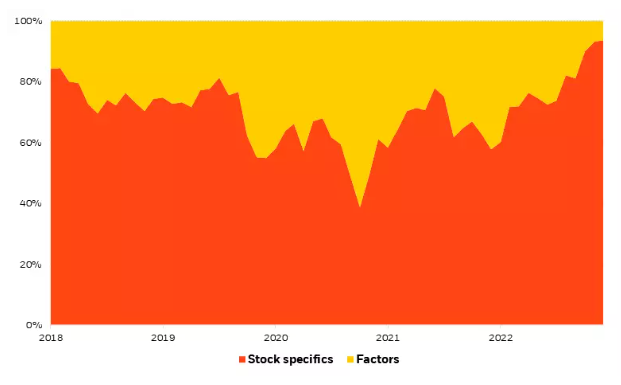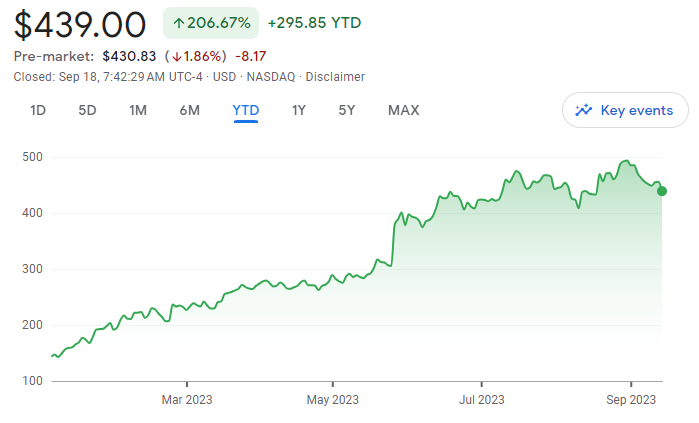Actively managed funds could be the best option for investors as equity markets head for further volatility, according to BlackRock’s global CIO of fundamental equities, Tony DeSpirito.
BlackRock has one of the largest offerings of passive funds with more than 300 exchange-traded funds (ETFs) in its iShares range, yet DeSpirito said it was time to take “a fresh look at how to gain equity exposure”.
Higher stock valuations and rising interest rates have created greater opportunity for active managers to generate alpha and above-market returns, he added.
The growing importance of stock specifics is a major reason for this. Stock performance was largely led by wide macro factors after Covid struck in 2020, but rapid monetary tightening in the following years has put significance mostly on the characteristics of individual stocks.
Decomposition of stock return dispersion from 2018 to 2023

Source: BlackRock
The above graph looks at stock dispersion over the past five years. DeSpirito noted there was little difference between the market’s best and worst performers since the global financial crisis.
He added that markets are moving away from this “beta-driven environment in which a rising tide lifted all boats” towards one where stock returns are more diverse.
“While the continuation of these trends cannot be assured, we believe active selection focused on fundamentals can have greater bearing on investor outcomes,” DeSpirito explained.
“We also expect to see an increasing shift in focus from macro concerns to how individual companies are able to navigate an environment of slower growth and higher inflation and rates, making company specifics more important to investment decision making.”
There are examples of tight stock dispersion this year in the US. DeSpirito pointed out that the five largest companies accounted for 22% of the S&P 500’s market cap in June, compared to 16% before the pandemic.
He said: “As the market increasingly acknowledges and values company fundamentals, we expect market breadth to widen beyond the current leaders and create greater opportunity for active stock pickers with the research capabilities to identify companies with strong fundamentals and attractive long-term growth prospects.”
Indeed, most of 2023’s best performers have benefited from excitement around artificial intelligence, with early-adopters such as Nvidia making share price gains upwards of 200% this year.
Share price of Nvidia in 2023

Source: Google Finance
However, the AI theme that has driven a small number technology companies could spread to other sectors and create broader stock dispersion, according to DeSpirito.
The main beneficiaries this year have been those directly linked to AI technology, but there is an abundance of companies that have yet to integrate the software into their business models.
DeSpirito said: “The impact is not limited to the tech sector. Across industries, we expect new business models will arise, powered by AI innovation.
“Understanding using AI, implications and risks across sectors, industries and individual stocks will have growing influence on investment outcomes, in our view.”
Equity markets may have performed well this year compared to 2022 – and AI may create opportunities for businesses in future – but DeSpirito said there is trouble looming for stocks.
He explained that volatility in the stock market has been relatively muted while rates volatility has been high, making higher volatility among equites more likely.
This could create some attractive entry points as share prices sink to attractive levels, but it also heightens the need for managers to actively select stocks.
DeSpirito said: “This disconnect suggests ample uncertainty in the marketplace and greater potential for equity volatility to pick up.
“The market dips inherent in volatility can lead to mispricings, presenting opportunities for active stock pickers to purchase shares of companies with good prospects at a discount.”





